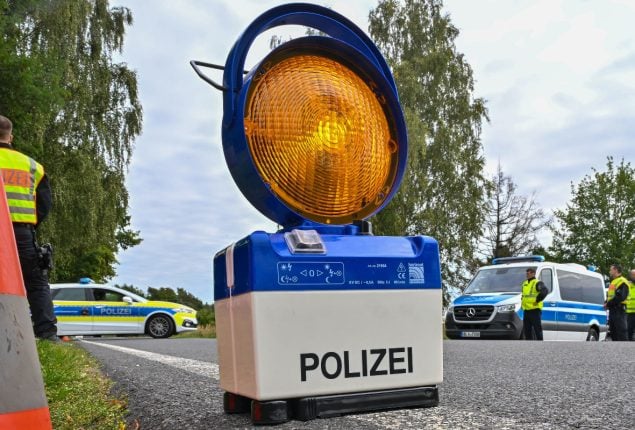Donald Trump’s sons rigid in New York fraud trial & try to pin blame on cpas
Donald Trump's sons are rigid in the New York fraud trial &...

Surge in illegal immigration rise to border control in Germany
Armed police officers have been deployed to halt vehicles on the motorway connecting Poland to Germany, where they are searching for human traffickers and individuals in desperate circumstances attempting to cross the border.
This action is the German government’s latest effort to demonstrate control over the rising levels of irregular migration.
However, our investigation in a rural border district reveals that the situation is far from under control. Altenberg, a small town in Saxony near the Czech Republic, offers picturesque scenes with families enjoying a toboggan run through the forest and a small ski resort in winter.
Yet, the local mayor, Markus Wiesenberg, discloses that in this area alone, human traffickers drop off people almost daily, leaving local services and residents under strain.
Local people sometimes discover sleeping bags and campfires in the woods, raising concerns for their children’s safety.
The issue of migration has become a prominent topic in the national discourse, especially with the far-right’s increasing influence on the matter, which has led to gains in regional elections.
The government ordered “temporary” checks on Germany’s land borders with Poland, the Czech Republic, and Switzerland last month.
These controls were renewed this week and have been a fixture on the border with Austria for years, all within the EU’s Schengen Zone, which is meant to be border-free.
In September, Federal Police reported the highest monthly figure of 21,366 people entering Germany illegally since early 2016. Germany remains a top destination for asylum seekers, receiving around 30% of the 100,000 applications filed within the EU, Norway, and Switzerland in August.
In a former youth hostel in rural Saxony, over 50 men await their fate. Muhammad Abdoum, a 33-year-old from Syria, has successfully applied for asylum and aspires to find work.
While he remains positive, he becomes emotional when reflecting on the lost years he endured during his journey.
The journey was arduous, leading them from war-torn Syria through the Balkans to this remote outpost near the Czech border for many. Now they dream of building a life in Germany.
Meanwhile, in a nearby village square, a small crowd gathers to protest the possible use of nearby apartments to house migrants. Concerns are expressed, with some fearing for their safety if large numbers of young men arrive.
The rise of the far-right, anti-immigration Alternative für Deutschland (AfD) party in the polls has prompted the German government to take action.
Plans to expedite deportations of failed asylum seekers are being introduced, and Chancellor Olaf Scholz has sought to increase the number of returns during a visit to Nigeria.
According to Gerald Knaus, chair of the European Stability Initiative think tank in Berlin while Chancellor Scholz denies that the AfD’s recent state election successes have influenced his decisions, discussions in government have intensified due to a “sense of fear.”
Knaus dismisses border checks and fast-tracking asylum applications as “fake solutions” and suggests reviving and expanding agreements similar to the 2016 deal with Turkey to other countries like Senegal, Morocco, and Rwanda.
Some senior political figures in Germany, including those within the governing coalition, advocate for third-country deals, where asylum claims could be processed in nations through which migrants pass on their way to the EU.
Successful claimants would proceed to Germany, while the UK’s deal with Rwanda, currently facing legal challenges, would have refugees stay in the Central African country.
Chancellor Scholz will meet with Germany’s regional leaders, with migration anticipated to be a top item on the agenda. Germany grapples with the intersection of efforts to address irregular migration and address labor shortages through attracting skilled foreign workers on Monday.
Furthermore, Germany has taken in over a million people from Ukraine, particularly women and children, following Russia’s full-scale invasion.
The rise in irregular migration appears to be bolstering the far-right’s influence, as elected leaders are accused of avoiding the issue.
Mayor Markus Wiesenberg, a member of Angela Merkel’s Christian Democrat party, acknowledges a perception that the federal government is not adequately addressing the situation. The lessons of the 2015 European migration crisis seem to have been forgotten, leaving the nation feeling unprepared.
To stay informed about current events, please like our Facebook page https://www.facebook.com/BOLUrduNews/.
Follow us on Twitter https://twitter.com/bolnewsurdu01 and stay updated with the latest news.
Subscribe to our YouTube channel https://bit.ly/3Tv8a3P to watch news from Pakistan and around the world.
Catch all the International News, Breaking News Event and Latest News Updates on The BOL News
Download The BOL News App to get the Daily News Update & Follow us on Google News.